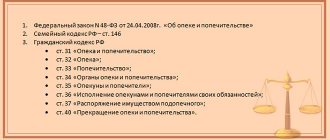For families who plan to accept someone else's child into the family, there are several options: guardianship (trusteeship), adoption or foster family (patronage). We will tell you in our material what differences there are between these forms of accepting a child into a family and how payments differ for them.
Bankiros.ru
Can grandparents take custody of their grandchildren while their parents are alive?
The most common reasons for transferring custody of children to grandparents are alcoholism and drug addiction of parents, cases of child abuse or imprisonment of parents.
But besides these sad reasons, temporary guardianship can also be issued in the following cases:
- Parents leaving to work in another country.
- Moving a child to another city for study.
- Long expedition or business trip for parents.
- Serious illness of parents.
- Other circumstances that do not allow the mother and father to care for the child.
The legislation does not contain a closed list of reasons for which temporary guardianship is possible. Parents themselves have the right to decide when to place their children in the care of relatives.
You need to understand that temporary custody is not a deprivation of parental rights to the child’s biological parents. They retain all the rights and responsibilities in relation to the children, but during the absence of parents, the same rights and responsibilities arise for temporary guardians.
Conditions
For a grandmother to become a guardian for her grandchildren, the parents must, due to various circumstances, be unable to fully care for their children. We list only the most common situations.
Incapacity
In this case, the grandmother has a high chance of becoming a guardian for her grandson (grandchildren) when both parents are incapacitated.
For example, this happens when the father and mother of the child have not yet reached 16 years of age.
If only one of the parents lacks legal capacity, the second has an advantage over the grandmother in terms of raising children.
Features of temporary guardianship
In accordance with Article 13 of the Federal Law “On Guardianship and Guardianship,” temporary guardianship is appointed at the request of parents for a period when they cannot take care of the child on their own. Temporary guardianship and trusteeship are forms of child care. Guardianship is assigned for children under 14 years of age, and guardianship for children from 14 to 18 years of age.
Temporary guardianship can be assigned only at the request of the parents. In this case, both parents must submit the application, even if they are divorced. The exception is the situation when the mother or father is raising the child alone.
Temporary guardianship can be appointed either on the basis of an application from the parents or at the request of the child over 14 years of age.
Other features of the guardianship appointment process include:
- The ability of parents to determine its duration at their own discretion.
- Guardianship can be terminated early based on the parents' application.
- The procedure for obtaining temporary guardianship is the same as for permanent guardianship.
- Prospective guardians must collect the same set of documents as when registering permanent guardianship.
- Temporary guardians have the same rights as permanent guardians and must perform all the same responsibilities.
- Guardians do not receive money for guardianship, and the ward is not assigned an allowance.
- Temporary guardianship does not have the same benefits as permanent guardianship.
- The PLO monitors the observance of the rights of the child and the fulfillment of their duties by guardians.
Thus, temporary custody is a voluntary decision of parents and guardians. It is necessary only in certain situations when parents are physically unable to fulfill their duties.
When is guardianship not possible?
Reasons for refusal:
- Grandmother cannot be a guardian. This situation is possible if not all documents have been collected, if there is a disease that precludes parental responsibilities (tuberculosis, HIV, oncology, group I or II disability), or the grandmother has been convicted of a serious or especially serious crime.
- Child's opinion. If a minor over 10 years of age refuses, guardianship cannot be appointed.
- Mom and Dad's opinion. If done at the request of the parents, their consent is required.
Why is temporary guardianship needed?
In situations where children need to be left with grandparents for a long time, many parents do not see the need to appoint temporary guardianship. Usually parents reason that even without formalizing guardianship, relatives will take care of the child.
Indeed, from an everyday point of view, grandparents will support and raise a child, but they will not be able to provide legal protection of his rights, since they will be deprived of legal grounds for representing his interests.
A common example is a single mother leaving to work or study in another city. She leaves the child with her grandmother, and during the mother’s absence, a free place appears in the local kindergarten. But the grandmother does not have the legal authority to apply to the kindergarten and the place was taken by another child.
More serious incidents also occur that require decisions to be made instead of parents. For example, a child had an accident, as a result of which he needed surgery. The parents could give consent to it, but they were working on a rotational basis at that time. Since temporary guardianship was granted to the grandmother, she signed the necessary medical documents. Without legal guardianship, she would not have been able to do this.
Why does grandma need a guardian?
Expert opinion
Stanislav Evseev
Lawyer. Experience 12 years. Specialization: civil, family, inheritance law.
Grandchildren and children are obliged to help their elderly relatives both physically and financially. If loved ones refuse to provide support, powers may be forcibly assigned.
For example, alimony can be collected from grandchildren by court decision. The initiator of an appeal to the court can be the grandmother herself (if she has full legal capacity) or her guardian (if the woman is deprived of legal capacity).
If the grandmother only needs physical help (cleaning, cooking, going to the store), then it is necessary to apply for patronage. This is an official form of care for persons over 80 years of age and group 1 disabled people.
A prerequisite for the appointment of patronage is the need for constant outside care and reaching the age of 80 years.
If the grandmother cannot understand the consequences of her actions (abused alcohol, used drugs, has a mental illness), then it is necessary to raise the question of depriving her of legal capacity.
If this issue is not resolved in a timely manner, the woman may become a victim of scammers who will deprive her of her living space. It may also cause damage to the property or health of third parties. To avoid such troubles, it is advisable to arrange guardianship over her.
The guardian is vested with the following powers:
- caring for the ward;
- protection of rights and legitimate interests;
- providing grandmother with medical care;
- representation of interests in court and government bodies.
It is the guardian who bears responsibility for his actions performed by the ward. For example, in the event of damage (flooding of a neighbor’s apartment), the guardian will pay for repairs.
Requirements for a temporary guardian or trustee
Any close relative (grandparent, uncle or aunt) can be chosen by the parents as a guardian. The future guardian must:
- Give consent to the registration of guardianship, since Article 11 of the Federal Law “On Guardianship and Trusteeship” determines the voluntary nature of the appointment of guardianship.
- Comply with the requirements established by Articles 146 of the RF IC and 35 of the RF Civil Code.
- Submit documents to the OOP and undergo verification. The verification procedure is determined by Decree of the Government of the Russian Federation No. 423 of 2009.
As a result, the applicant is issued a conclusion on the right to be a guardian.
Russian legislation establishes the same requirements for a temporary guardian as for permanent guardians:
- Coming of age.
- Legal capacity.
- Russian citizenship.
- Having a permanent place of residence.
- Stable source of permanent income.
- Absence of alcohol and drug addiction, as well as dangerous diseases (their list is indicated in the Decree of the Government of the Russian Federation No. 118 of 2021).
- No criminal record.
- The guardian must not have previously been deprived of parental rights or removed from guardianship due to a violation of the rights of the ward.
Also, when considering a guardian, their characteristics, reputation and moral character will be assessed.
Frequently asked questions when applying for child custody:
Can a single person without a family apply for child custody?
Guardianship is always issued to only one citizen, regardless of whether he has a family or not, but if there is a family, their written consent to the procedure must be provided. Any citizen who meets the candidate requirements has the right to apply for guardianship of a minor.
It is important to take into account the fact that if documents are submitted simultaneously in relation to a particular child by a single person and by a person in a family relationship, the family will have an advantage. The same benefits apply when a woman and a man apply; preference will be given to the woman.
If a single person applies for guardianship or trusteeship, then you must be prepared to answer many personal questions, including the reasons for the absence of your own children, the reasons for the absence of marriage or the circumstances of the divorce, the circumstances that prompted you to take the child, and others.
How to obtain guardianship for a child from another region?
The applicant must collect all the necessary documents, contact the local guardianship office and obtain a guardian's certificate, and then contact the regional children's data bank. You can view children’s profiles on the websites of regional and federal data banks and contact the department of guardianship authorities of the region where the minor lives with a question using the details specified in the questionnaires.
be careful
Due to recent changes in legislation, the legal information in this article may have lost its relevance. Contact our lawyer for a free consultation using an online consultant or write your question in the form below:
Procedure
The process of obtaining temporary guardianship includes:
- Consultation in the PLO.
- Preparation of documents for the ward and guardian.
- Drawing up an application for guardianship.
- Verification of submitted documents.
- Checking the guardian's living conditions.
- Issuing a conclusion on the right to be a guardian.
- Issuance of a decision on the appointment of temporary guardianship.
Some stages need to be considered in more detail.
Where and how to register guardianship?
The procedure includes the following steps:
- Contacting the authority. Visit the social welfare service at your place of residence. The specialist will familiarize you with the requirements that a guardian must meet, his rights and responsibilities, introduce you to the process of becoming a guardian, and give you directions for training.
- Preparation of documents. The USZN employee will issue a list of documents that will be needed for the process of accepting the ward.
- Certificate training. Upon referral, go to a specialized institution for training guardians. Training is free.
- Submitting an application. After completing the training, make a formal request with detailed information about yourself and your ability to care for the person in your care. You can submit an application by visiting the guardianship authority in person or via the Internet (State Services portal).
- Identity verification. Within 2 days, employees of the Peki authority will conduct a study of the applicant’s data and, if necessary, request information from the police, medical institutions, and civil registry offices.
- Checking the caregiver's living conditions. Representatives of the guardianship service will inspect the applicant’s home, based on the results of which they will draw up a report.
- Receiving a response to the application. After the inspection, the USZN is obliged to make a decision and familiarize the candidate with the conclusion in person or by mail.
- Selection of a mentee. This stage applies to people who want to take care of a stranger; close relatives skip this stage. You can choose a child from any region of the country. For children 10 years of age and older, guardianship specialists ask their opinion and obtain their consent.
- Getting to know your mentee. After the choice, direct communication takes place between the parties based on a referral from the social protection authority at the location of the ward or the registration of the guardian.
- Registration of guardianship. When you have decided on your ward, announce your choice to the guardianship authority. He will issue an order (resolution) to appoint guardianship. With the writ of execution and passport, go pick up your ward.
Preparing an application
Article 13 of the Federal Law “On Guardianship and Trusteeship” states that an application must be submitted by both parents who, for good reasons, cannot raise a child for a certain time.
The text of the application must indicate:
- OOP name.
- Parents' details (full name, place of residence, date of birth).
- Child details.
- Detailed information about the future guardian.
- Duration of guardianship.
- Reasons for its design.
- Consent for the child to live with a guardian.
- Consent to temporarily transfer legal rights to represent the child to the guardian.
- Request to transfer the child into temporary custody.
- Date and signatures of applicants.
Additionally, grandparents who wish to become guardians submit an application for the opportunity to become one.
For such applications there is a special form, the form of which is established by Order No. 4 of the Ministry of Education of the Russian Federation of 2019.
The statement states:
- OOP name.
- Passport details of the potential guardian.
- Information about his criminal record or lack thereof.
- Information about place of residence.
- Information about the pension, if the guardian receives one.
- Full name, dates of birth and family ties of persons living with the guardian and their consent to live together with the ward.
- Information about the caregiver's health status.
- Information about his financial security and employment.
- Any additional information about raising children, family ties with the ward, training for guardians.
- Request for guardianship.
- Date and signature.
- List of attached documents.
Who can take custody of children?
Any capable person who does not have any of the following restrictions can be a guardian or trustee of minor children with living parents:
- has never previously been deprived of parental rights;
- has not previously been brought to any responsibility (administrative, criminal, etc.)
- absence of bad habits.
There is one more important requirement - the age of majority of the applicant for the role of guardian.
Rights and responsibilities of a guardian
All rights and obligations of a guardian/trustee are regulated by Family and Civil Law.
Responsibilities:
- providing the ward with a decent lifestyle (housing, clothing, food, etc.);
- take care of a healthy lifestyle and, in case of illness, provide proper care to the child and everything necessary for his recovery;
- create all possible living conditions for obtaining compulsory and vocational education;
- represent the interests and protect the rights of the child until he reaches his sixteenth birthday;
- notify the guardianship authority in case of a change of residence;
- dispose of all property of the ward with the consent of the guardianship authority;
- spend the monetary support of a minor provided by the state exclusively for his needs. Provide an annual report on the funds spent (if the child has a disability group).
Rights:
- choose a method of education, but taking into account the opinion of the guardianship authority;
- to receive subsidies and benefits from the state;
- In the event of force majeure situations, the guardian/trustee has the right to withdraw his powers.
Can a grandmother obtain guardianship over her grandchildren?
The grandmother is the closest woman to the child after the mother. The procedure for obtaining temporary guardianship of a child by a grandmother is similar to the general rules. The package of documents is identical.
The only difference is the fact that if the parents are alive, their consent is required, and in the event of the death of both, a statement from the grandmother and a document confirming the degree of relationship are sufficient. The child’s opinion is also necessarily taken into account (upon reaching 10 years of age).
Important! A grandmother cannot be a guardian of a child if her age is over sixty years old at the time of registration or she has limitations in her legal capacity. Although the law does not say anything about the age limit, in practice adult guardians are treated with special attention.
Verification of documents and place of residence
From the moment PLO employees receive the application for temporary guardianship, they are given three days to check it, as well as to check the submitted documents. During the inspection, the PLO has the right to request additional documents and clarify the necessary data.
They are usually interested in:
- Whether the grandfather or grandmother had a criminal record.
- What is the size of their pensions?
- Information about the family composition of grandparents at their place of residence.
An important stage is checking the sanitary and technical condition of the guardians’ housing. Within 5 days after receiving an application for registration of guardianship, POO employees must visit the applicants and assess the area of the living space, its lighting, level of heat, safety, as well as the availability of conditions for the child’s education, residence and leisure.
Details of the verification process are specified in the Order of the Ministry of Education of the Russian Federation of 2019.
Based on the results of the inspection, PIO employees will draw up a report. This document will be one of the most important when deciding on temporary guardianship.
Design algorithm
- The grandmother (another prospective guardian) must contact the guardianship department at her place of residence to obtain a list of documents.
Important! If the registered address and permanent address are different, you must select the department at your place of residence. It is they who will exercise control over the grandmother and child after the paperwork is completed.
- Parents must contact the guardianship department at their place of residence to have the application for the appointment of a legal representative certified.
Important! If the child's parents and guardian live in different areas, they must contact the guardianship departments of their territories. As a general rule, the department at the grandmother’s residence address issues a conclusion on the possibility of being a candidate for guardianship. However, the appointment of guardianship will be handled by the department where the child lives.
- Having collected the documents, you need to submit them to the guardianship department and write a statement. Within 3 days, a commission must come to the grandmother’s home to assess her living conditions.
- After reviewing the documents provided, the guardianship authority must issue the grandmother a conclusion on the possibility/impossibility of being a candidate for guardianship.
The conclusion about the impossibility of being a candidate for guardianship can be appealed in court within 10 days.
Required documents
The main documents for registration of guardianship are statements from parents and grandparents.
Attached is a list of documents for the guardian:
- His passport.
- Autobiography.
- Certificate of employment (indicating salary and position).
- Other certificates confirming income.
- Marriage certificate.
- Medical documents confirming the absence of diseases for which you cannot be a guardian.
- Consent of the guardian's family members (over 10 years old) to live together with the child under their care.
If a person who is not a relative of the child wants to become a guardian, he is required to additionally complete a preparatory course for guardian and trustee. As a result of completing the course, he will be given a corresponding certificate.
A number of documents must also be submitted for the child himself:
- Passport or birth certificate.
- Consent to registration of guardianship if the child is already 10 years old.
- Medical report.
- Documents on the basis of which the reasons for placing a child under temporary guardianship with living parents become clear.
Additionally, the PLO may request documents about the criminal record of the guardians, the composition of their family and the amount of their pension, as well as other documents necessary in a particular situation.
How to declare a grandmother incompetent for guardianship?
So, we have established that the appointment of guardianship is possible only over an incapacitated grandmother or grandfather (Article 29, Article 31—). This means that the procedure for registering guardianship must necessarily be preceded by a procedure for deprivation of legal capacity .
Only a court can declare an elderly or sick person incompetent. Chapter 31 of the Code of Civil Procedure of the Russian Federation contains the grounds and procedure for conducting a judicial procedure - in special proceedings .
Who can file a lawsuit for deprivation of legal capacity?
This right is vested in:
- family members (living together with grandparents) or close relatives: son or daughter, brother and sister, wife or husband: grandson or granddaughter,
- representatives of the Guardianship and Trusteeship Authority,
- representatives of a medical or social institution providing assistance to citizens suffering from mental and age-related mental disorders.
How to properly prepare a claim?
A statement of claim for deprivation of legal capacity, which is filed in court, must comply with the norms and rules for maintaining judicial procedural documentation (Article 131 of the Code of Civil Procedure of the Russian Federation - general requirements for the form and content of a statement of claim, Article 282 of the Code of Civil Procedure of the Russian Federation - requirements for the content of a statement of deprivation of legal capacity ).
Based on this, the application must contain the following data:
- Name, address of the judicial authority;
- Applicant details: Full name, address;
- Title: “Statement...”;
- Grandparent's details: Full name, date of birth, address;
- Information about family ties or cohabitation, which gives the right to go to court;
- Data on the reasons and grounds for going to court: mental disorder or age-related weakening of mental abilities, as a result of which the grandmother or grandfather lost the ability to realize, remember, and control themselves;
- Links to legislative provisions (Article 29 of the Civil Code of the Russian Federation, Article 281, Article 282 of the Civil Procedure Code of the Russian Federation);
- Application: declare the grandmother or grandfather incompetent;
- Date of;
- Applicant's signature.
What documents are needed?
Documents must be attached to the application submitted to the court...
- Identity card (passport);
- Confirming relationship (birth, marriage certificates),
- Confirming cohabitation (certificate of place of residence);
- Confirming a mental or mental disorder (certificates, conclusions of a medical commission);
A request to call witnesses or to conduct a forensic psychiatric examination can be attached to the application or submitted to the court during the trial.
Trial and court decision
The case of deprivation of legal capacity must be considered in the district or city court at the place of residence of the grandmother or grandfather - this is where documents must be submitted.
The first court hearing will be scheduled no later than 1 month after the documents are accepted by the court - notice of the date and place of the hearing must be sent to the applicant.
During the trial, the court may call and listen to witnesses, as well as order a forensic psychiatric examination to establish the actual mental state of the grandmother or grandfather (Article 283 of the Code of Civil Procedure of the Russian Federation). A psychiatric examination is carried out in two ways: the first is the study of medical documentation, the second is an examination of the patient. If a sick grandmother or grandfather refuses to visit a medical institution for examination, the court may issue a decree on forced arrival.
The expert's conclusions are set out in the expert report, which is submitted to the court, and is of decisive importance.
Having considered the application and supporting documents, as well as the expert’s opinion, the court makes a decision. A court decision declaring a grandfather or grandmother incompetent is the basis for the appointment of guardianship (Article 285 of the Code of Civil Procedure of the Russian Federation).
Payments and benefits
When assigning temporary guardianship, no benefits or subsidies are provided by the state. But the very process of raising and maintaining a child requires certain expenses from grandparents. They can reimburse them:
- Thanks to the voluntary help of the child's parents.
- By collecting alimony from parents.
- Managing the income of a grandson or granddaughter, if any (disability pension, survivor's pension or deposit payments).
Since temporary guardianship is arranged voluntarily, there is usually no talk about material issues.
Relatives themselves agree on reimbursement of expenses for the child. Facebook
Responsibilities and rights of a guardian
After registering guardianship over elderly parents, a person receives the right to carry out the following actions on behalf of the elderly person:
- manage pension payments, benefits;
- pay utilities;
- purchase food, clothing, household goods;
- go to court in order to recognize the mother and father as legally competent;
- voluntarily renounce further guardianship.
The responsibilities of a guardian include the following:
- Living together with the parents taken under guardianship in the same territory (exception - if separate living corresponds to the interests of the wards and is permitted by guardianship officials);
- Protecting the legitimate interests and rights of your parents;
- Performing legally significant actions on behalf of parents;
- Financial support for parents, caring for them, purchasing medications, paying for medical services;
- Providing assistance to restore the legal capacity of parents;
- Taking into account the opinions of parents when performing their duties;
- Reasonable disposal of property belonging to parents, protection of their property, competent management of it.
Abuse of rights by parents. Responsibility
Some parents, to please their needs, abuse their right given to them by the Constitution and Family Law, and directly violate the rights of their children, forcing them to engage in antisocial actions, such as:
- begging, theft;
- prostitution;
- alcoholism, drug addiction, etc.
In such cases, the court may make a decision to deprive them of their rights to raise a child, and in some situations impose criminal liability for their actions.
Guardian's age over 60 years
The general rules are described in various sources and sites, however, in practice, many are faced with a bunch of questions to which they cannot find answers.
What is the age limit for a guardian of minors, up to what age can one become a guardian and up to what age can guardianship be issued? We will try to answer these questions for you.
In the Civil Code of the Russian Federation, Article 35 provides a closed list of official requirements for guardians. Regarding age, it states that guardians are legally capable persons over 18 years of age. The legislator has not determined the age limit.
The age limit of a guardian or trustee is not limited by law!
However, in practice you can often hear that a person no older than 60 years old can become a guardian. This unspoken rule was applied by the guardianship authorities in order to protect the interests of children.
Citizens over 60 years of age may not be able to fully meet all the requirements for children. With age, memory, mental and physical indicators deteriorate. Guardianship requires a lot of activity, especially over children, and a lot of physical effort.
Another concern is that an adult may himself become infirm, either due to age and illness, or even die. This will be a strong psychological trauma for the child. Then he will have to get used to new people again, a new way of life, move, not to mention the loss of a loved one. Guardianship authorities try to ensure that guardianship ends on the basis of reaching 18 years of age, and not because of sad facts. Children should grow up in normal conditions under the guardianship of a responsible, active, positive person.
If there is a desire to appoint a person over 60 years of age as a guardian, the guardianship authorities cannot give a categorical answer if the citizen looks good and feels good. In any case, it is necessary to submit an application for consideration to the guardianship authorities, providing all possible data for a positive decision: medical certificates, references from neighbors, or even from work. If a citizen works, then the 2-NDFL certificate will also have a positive impact.
As mentioned above, close relatives have a priority right to guardianship, therefore guardianship authorities often appoint grandparents of children as guardians over 60 years of age.









